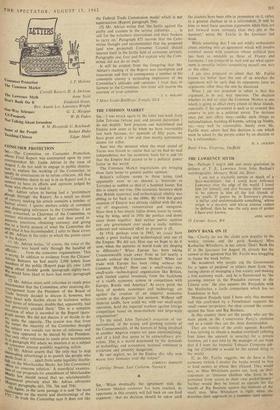THE COMMON MARKET
SIR,-1 was struck again by the letter last week from John Terraine (whose past and present patriotism I do not doubt): how precious our nationhood and Empire now seem to be when we have irrevocably lost both because, for upwards of fifty years, we have given only a few and then mostly sentimental damns for either.
Suez was the moment when the most stupid of
Tories was forced to realise that (a) we had .no real independence, nor tne economic basis for it and (b) that the Empire had ceased to be 'apolitical power factor in the world.
The Common Market negotiations are bringing these facts home to general public opinion. Britain's collapse seems in these terms (and
apparently even to so shrewd a' historian as Terraine) as sudden as that of a bombed house. Yet this is simply not true. The economic histories show that British economic and technological vitality was ebbing as far back as the 1880s. -By 1914 this great mansion of Empire was already riddled with the dry rot of stagnation, conservatism and smugness. Since then it has simply fallen down, room by room, wing by wing, until in 1956 the portico and dome came down together. And neither public opinion nor any government ever made a really ruthless, coherent and sustained effort to prevent it all. In 1914, perhaps even in 1945, we could have made a great trading and technological unit out of the Empire. We did not. How can we hope to do it now, when the patterns of world trade are shaping so differently? When Europe has been taking- Commonwealth trade away from us for' nearly a decade without the Common Market? When our trade with Europe has been rising without the Common Market? How can a small-scale—yes, small-scale—technological organisation like Britain, with limited capital resources, form the backbone of a viable economic system in competition with Europe, Russia and America? At every point the facts of modern economics and technology are against the creation of an imperial economic system at this desperate last moment. Without stiff imperial tariffs, how could we, with our small-scale operation, hold the imperial markets against foreign competition based on mass-markets and large-scale organisation?
To my mind, John Terraine's evocation of our nationhood, of the young and growing nations of the Commonwealth, of the horrors of being involved in another Angevin empire are pure emotionalising; and of a kind that seems to be extraordinary pre- valent. This is a world dominated by the demands of technology and economics; national sentiment is irrelevant and piassibly dangerous. By our neglect, we let the Empire die; why now weave love fantasies over the corpse?
CORRELL! BARNETT Catbridge House, East Carleton, Norwich






























 Previous page
Previous page